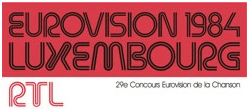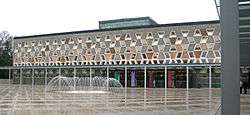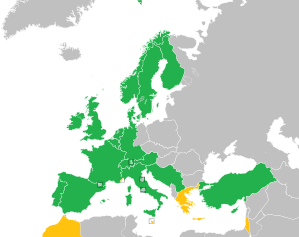Eurovision Song Contest 1984
| Eurovision Song Contest 1984 | |
|---|---|
 | |
| Dates | |
| Final | 5 May 1984 |
| Host | |
| Venue |
Grand Theatre Luxembourg City, Luxembourg |
| Presenter(s) | Désirée Nosbusch |
| Conductor | Pierre Cao |
| Directed by | Rene Steichen |
| Executive supervisor | Frank Naef |
| Host broadcaster | RTL Télévision (RTL) |
| Opening act | In an introductory video, Pierre Cao and the RTL orchestra performed instrumental versions of all the past Eurovision winners from Luxembourg and L'amour est bleu, one of Luxembourg's most popular entries. |
| Interval act | Prague Theatre of Illuminated Drawings |
| Participants | |
| Number of entries | 19 |
| Debuting countries | None |
| Returning countries |
|
| Withdrawing countries |
|
|
Participation map
| |
| Vote | |
| Voting system | Each country awarded 12, 10, 8-1 point(s) to their 10 favourite songs |
| Nul points | None |
| Winning song |
"Diggi-Loo Diggi-Ley" |
The Eurovision Song Contest 1984, the 29th event of its kind, was held on 5 May 1984 in Luxembourg. The presenter, Désirée Nosbusch, only 19 years old at the time, hosted the show in a lax manner, which was quite unusual for the show at the time. She manifested her fluency in four languages by switching between a strong transatlantic English, French, German and Luxembourgish in the course of talking, often in the same sentence.
Sweden's the Herreys were the winners of this contest with the song, "Diggi-Loo Diggi-Ley". This was the Nordic country's second win, and the first song performed in Swedish. The previous Swedish winner, ABBA, ten years ago had performed their song "Waterloo" in English. Richard and Luis Herrey became the first teenage males to win Eurovision and remain the youngest ever male winners, being 19 years and 260 days and 18 years and 184 days of age respectively[1].
Israel withdrew from the contest due to Yom Hazikaron (Day of Remembrance for the Fallen Soldiers of Israel and Victims of Terrorism) being commemorated on the same date. Iceland was going to participate but withdrew due to lack of financial support.[2] 1984 is also a notable for the audible booing that could be heard from the audience, particularly at the end of the UK's performance. It was said that the booing was due to English football hooligans having rioted in Luxembourg in November 1983 after being knocked out of the UEFA European Football Championship. However, the song itself managed a pretty good showing, reaching seventh place.
Location

The city of Luxembourg, also known as Luxembourg City, is a commune with city status, and the capital of the Grand Duchy of Luxembourg. It is located at the confluence of the Alzette and Pétrusse Rivers in southern Luxembourg. The city contains the historic Luxembourg Castle, established by the Franks in the Early Middle Ages, around which a settlement developed.
The Grand Théâtre de Luxembourg, inaugurated in 1964 as the Théâtre Municipal de la Ville de Luxembourg, became the venue for the 1984 contest. It is the city's major venue for drama, opera and ballet.[3][4] It also hosted the 1973 edition of the Eurovision Song Contest.
Conductors
Host conductor in bold







.svg.png)



.svg.png)







Returning artists
| Artist | Country | Previous year(s) |
|---|---|---|
| Mary Roos | 1972 | |
| Izolda Barudžija | 1982 (part of Aska), 1983 (part of Danijel's back vocals) |
Results
Notes
Voting structure
Before the contest, Sweden was not expected to win or even achieve a high placing. In the run-up to the Contest, bookmakers Ladbrokes had the lowest odds on songs from Ireland, Italy, and the United Kingdom. Sweden was considered a "dark horse" entry with high odds.
Each country had a jury that awarded one to eight, 10 and 12 points for their top ten songs.
At the close of the penultimate jury's votes, there was only a difference of six points between Sweden and Ireland, at 141 and 135 respectively. However, Yugoslavia was the only country who had not given any points to Ireland, and Portugal, the last jury, gave that western country only two points, crushing their chances. Portugal's voting also cost Denmark, who had been holding at a strong third position, even leading the scoreboard for a short time, in that place, when Portugal's 12 lifted Spain from 94 to 106 points. Portugal at the same time had only given Denmark one point making Denmark's total 101 points. Despite this, this was latter country's best position in over 20 years.
Halfway through the voting, the scoreboard turned blue and remained so until the end of the voting. This was visible only to television viewers.
Score sheet
| Results | |||||||||||||||||||||
|---|---|---|---|---|---|---|---|---|---|---|---|---|---|---|---|---|---|---|---|---|---|
| Sweden | 145 | 6 | 6 | 4 | 10 | 7 | 12 | 7 | 12 | 12 | 10 | 4 | 12 | 12 | 3 | 8 | 10 | 6 | 4 | ||
| Luxembourg | 39 | 7 | 7 | 5 | 5 | 8 | 4 | 3 | |||||||||||||
| France | 61 | 2 | 2 | 6 | 3 | 10 | 12 | 8 | 4 | 7 | 7 | ||||||||||
| Spain | 106 | 10 | 8 | 10 | 6 | 4 | 6 | 3 | 7 | 7 | 2 | 2 | 6 | 12 | 3 | 8 | 12 | ||||
| Norway | 29 | 8 | 7 | 1 | 3 | 2 | 6 | 2 | |||||||||||||
| United Kingdom | 63 | 3 | 1 | 3 | 8 | 2 | 2 | 8 | 1 | 4 | 1 | 2 | 7 | 1 | 4 | 10 | 6 | ||||
| Cyprus | 31 | 4 | 1 | 4 | 10 | 12 | |||||||||||||||
| Belgium | 70 | 12 | 12 | 2 | 3 | 8 | 3 | 4 | 5 | 10 | 1 | 10 | |||||||||
| Ireland | 137 | 12 | 5 | 3 | 10 | 4 | 8 | 10 | 12 | 3 | 7 | 10 | 10 | 10 | 7 | 12 | 12 | 2 | |||
| Denmark | 101 | 5 | 3 | 8 | 6 | 12 | 12 | 5 | 8 | 10 | 3 | 6 | 4 | 5 | 2 | 5 | 1 | 5 | 1 | ||
| Netherlands | 34 | 2 | 7 | 8 | 1 | 6 | 5 | 5 | |||||||||||||
| Yugoslavia | 26 | 2 | 3 | 8 | 3 | 8 | 2 | ||||||||||||||
| Austria | 5 | 1 | 4 | ||||||||||||||||||
| Germany | 34 | 4 | 7 | 2 | 6 | 2 | 5 | 1 | 2 | 5 | |||||||||||
| Turkey | 37 | 6 | 5 | 4 | 2 | 1 | 10 | 3 | 6 | ||||||||||||
| Finland | 46 | 7 | 5 | 1 | 5 | 4 | 6 | 3 | 5 | 1 | 6 | 3 | |||||||||
| Switzerland | 30 | 1 | 10 | 1 | 5 | 8 | 1 | 4 | |||||||||||||
| Italy | 70 | 10 | 12 | 1 | 7 | 6 | 7 | 12 | 7 | 8 | |||||||||||
| Portugal | 38 | 4 | 5 | 6 | 7 | 8 | 8 | ||||||||||||||
12 points
Below is a summary of all 12 points in the final:
| N. | Contestant | Voting nation |
|---|---|---|
| 5 | Sweden | Austria, Cyprus, Denmark, Germany, Ireland |
| 4 | Ireland | Belgium, Italy, Sweden, Switzerland |
| 2 | Belgium | France, Luxembourg |
| Denmark | Norway, United Kingdom | |
| Italy | Spain, Finland | |
| Spain | Portugal, Turkey | |
| 1 | Cyprus | Yugoslavia |
| France | Netherlands |
Commentators







.svg.png)



.svg.png)









Spokespersons







.svg.png)



.svg.png)







National jury members

References
- ↑ O'Connor, John Kennedy. The Eurovision Song Contest - The Official Celebration. Carlton Books, 2015. ISBN 978-1-78097-638-9. Pages 32-33
- ↑ "Morgunblaðið, 20.03.1983". Timarit.is. Retrieved 2013-04-29.
- ↑ "The "Grand Théâtre" of Luxembourg City offers high quality cultural events" Archived 2011-07-22 at the Wayback Machine., Luxembourg National Tourist Office, London. Retrieved 27 December 2010.
- ↑ "Grand Théâtre de Luxembourg" Archived 2011-07-22 at the Wayback Machine., Théâtre Info Luxembourg. (in French) Retrieved 27 December 2010.
- ↑ "Eurovision Song Contest 1984". The Diggiloo Thrush. Retrieved 4 March 2012.
- 1 2 "Infosajten.com". Infosajten.com. Archived from the original on July 18, 2012. Retrieved 2012-08-10.
- 1 2 3 Christian Masson. "1984 - Luxembourg". Songcontest.free.fr. Retrieved 2012-08-10.
- ↑ "FORO FESTIVAL DE EUROVISIÓN • Ver Tema - Uribarri comentarista Eurovision 2010". Eurosongcontest.phpbb3.es. Archived from the original on 2012-03-17. Retrieved 2012-08-10.
- ↑ "Hvem kommenterte før Jostein Pedersen? - Debattforum". Nrk.no. Archived from the original on November 2, 2012. Retrieved 2012-08-10.
- ↑ Eurovision Song Contest 1984 BBC Archives
- ↑ Roxburgh, Gordon (2017). Songs For Europe - The United Kingdom at the Eurovision Song Contest Volume Three: The 1980's. UK: Telos Publishing. p. 202. ISBN 978-1-84583-118-9.
- 1 2 Savvidis, Christos (OGAE Cyprus)
- ↑ Adriaens, Manu & Loeckx-Van Cauwenberge, Joken. Blijven kiken!. Lannoo, Belgium. 2003 ISBN 90-209-5274-9
- 1 2 "Forside". esconnet.dk. Archived from the original on 2012-03-24. Retrieved 2012-08-10.
- ↑ "Welkom op de site van Eurovision Artists". Eurovisionartists.nl. Retrieved 2012-08-10.
- ↑ Archived October 24, 2007, at the Wayback Machine.
- ↑ "Eurovision Song Contest 1984". Ecgermany.de. Retrieved 2012-08-10.
- ↑ "Selostajat ja taustalaulajat läpi vuosien? • Viisukuppila". Viisukuppila.fi. Retrieved 2012-08-10.
- ↑ "Comentadores Do ESC - escportugalforum.pt.vu | o forum eurovisivo português". 21595.activeboard.com. Archived from the original on April 21, 2012. Retrieved 2012-08-10.
- ↑ Zitrone, Léon et al. (May 5, 1984). 29ème Concours Eurovision de la Chanson 1984 [29th Eurovision Song Contest 1984] (Television production). Luxembourg: RTL, Antenne 2 (commentary).
- ↑ Dyrseth, Seppo (OGAE Norway)
- 1 2 "The Eurovision Song Contest (1984 TV Special) : Full Cast & Crew". IMDb.com. Retrieved 2013-10-22.
- ↑ Leidse Courant, 5 May 1984
- ↑ "Selostajat ja taustalaulajat läpi vuosien? • Viisukuppila". Viisukuppila.fi. Retrieved 2012-08-10.
- ↑ Baumann, Peter Ramón (OGAE Switzerland)
- ↑ "000webhost.com - free web hosting provider". Eurofestival.host22.com. Retrieved 2012-08-10.
External links
| Wikimedia Commons has media related to Eurovision Song Contest 1984. |

